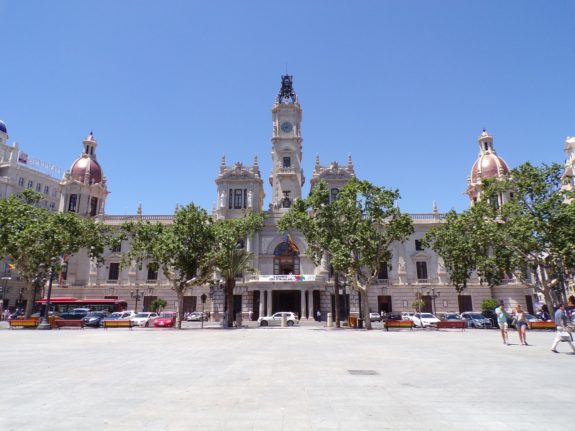There was a headline in the Spanish satirical newspaper El Mundo Today some time ago that said: “The UN declares Murcia a catastrophe zone without anything in particular having happened.”
Another read “The Government gives permission to Saudi Arabia to test weapons it has sold in Murcia.”
And how about when Spanish tennis superstar Carlos Alcaraz (a proud Murciano) won Wimbledon last summer? “Government considers recognising Murcia as part of Spain after Alcaraz’s victory.”
READ ALSO: Nine things you need to know before moving to Spain’s Murcia region
If you’ve lived in Spain for a while, wherever it is, this probably won’t come as a surprise.
You may come across people making jokes about Murcia, the small south-eastern region sandwiched between its bigger neighbours the Valencian Community and Andalusia.
According to a survey reported by La Sexta, Murcia came dead last in a ranking of Spanish regions, crowning it the “least liked region in Spain.”
‘Murcia doesn’t exist’
As such, Murcia and its people (Murcianos) are often the butt of Spanish jokes. ‘Murcia no existe‘ (Murcia doesn’t exist) or Murcia es Africa (Murcia is Africa) are two of the most common jibes to hear directed at Murcianos, as well as gags about lemons and olive oil and the endless swathes of farmland.
Many Spaniards will even mock the names of towns and villages in Murcia. Some standout examples include Alcantarilla (literally drain or gutter), Escombreras (dump or tip) or Los Infiernos (The Underworlds or hells).
Fortunately, due to their kind-hearted nature, many Murcianos couldn’t care less and take it in their stride, laughing off these snobby ‘city-types’ who look down on them.
But why is it exactly that Murcia is so often the butt of all the jokes in Spain?
Accent
For many Murcianos who move to different parts of Spain (or come across other Spaniards abroad) one of the first things people will comment on is their accent. Often it becomes a bit of a running joke to playfully mock it.
That said, in Murcia the accent can be as fierce as the heat down there and, for non-naive speakers, a little tricky to understand at times. Famous (or infamous) among other Spaniards for their closed accent, just like in Andalucía Murcianos often drop the end of words all together – particularly the D’s and S’s.
So los perros (the dogs) often sounds a bit more like lo perro, for example.
READ ALSO: A handy guide to understanding Spain’s regional accents
This can be confusing when you first arrive, but after a few months you’ll be calling people ‘acho’ – a diminutive form of the Spanish ‘muchacho‘ – that is very common in Murcia and people love to imitate and make jokes about across the country.
In fact, if someone from Madrid or Galicia or pretty much anywhere else in Spain meets a Murciano, one of the first things they might say is acho!
Other common jokes about the Murcian accent and dialect include pijo, saying hostia (something like bloody hell or holy shit) without pronouncing the ‘S’ sound, or using the diminutive word ending –ico for someone or something.
READ ALSO: Staycation in Spain: Five great reasons to visit Murcia
Climate
Another of the main reasons Murcia is the butt of many jokes in Spain is because of the climate. This ties into the Murcia es Africa stuff, because if you’ve spent time in the southern region during the summer, you’ll know how scorching hot it can get.
Like the rest of southern Spain Murcia is sizzling hot, but in the height of summer it stands apart. Temperatures can top 40C in the summer months, and it very rarely rains, leading many Spaniards to joke about it being 45C in the shade in Murcia.
While probably not true, during the summer months many locals don’t leave the house during the afternoon, preferring to get everything done in the morning and at night to avoid the dry heat. A cold winter in Murcia is considered 10C, with temperatures occasionally reaching the high tens or early twenties.
Classism
Sometimes this playful banter can veer into classism. Each region of Spain has its own stereotypes, whether it be Catalans being stingy or strong headed, Asturians heavy drinkers, or Andalusians party loving.
Often when it comes to Murcia, however, these stereotypes are steeped in a little classism. Jokes about Murcia often portray the people as what we might call in English ‘rednecks’, or poorly educated and poorly spoken. If you watch Spanish TV or listen to the radio, still, to this day, Murcian accents (as well as Andalusian) are underrepresented, and some of this undoubtedly comes from snobbery or classism.
READ ALSO: The good, the bad and the ugly: What are the regional stereotypes across Spain?
Though, to be fair, parts of rural Murcia feel a little outdated at times. For all the old world charm and hospitality, some may find life in small town Murcia somewhat old-fashioned or conservative. Whether it be the lack of public transport infrastructure, international chains and brands we’ve become accustomed to, or perhaps even a political opinion not heard in bigger cities for a couple of decades, in some small Murcian towns life seems to be a few decades behind – for better or worse.
For a better idea of the sorts of jokes Murcianos face around Spain, the comedy skit ‘El Murciano’ below encapsulates the classic ones pretty well.



 Please whitelist us to continue reading.
Please whitelist us to continue reading.
Member comments